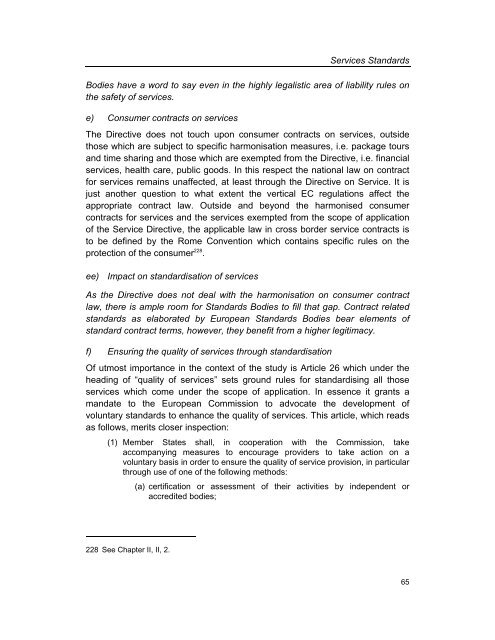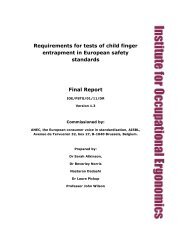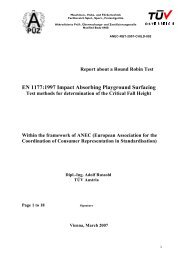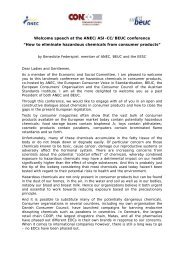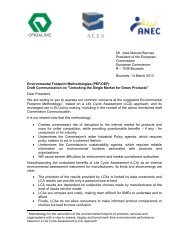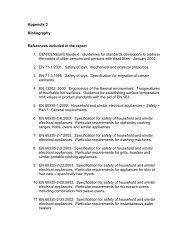Services Standards: Defining the Core Consumer Elements ... - ANEC
Services Standards: Defining the Core Consumer Elements ... - ANEC
Services Standards: Defining the Core Consumer Elements ... - ANEC
You also want an ePaper? Increase the reach of your titles
YUMPU automatically turns print PDFs into web optimized ePapers that Google loves.
<strong>Services</strong> <strong>Standards</strong><br />
Bodies have a word to say even in <strong>the</strong> highly legalistic area of liability rules on<br />
<strong>the</strong> safety of services.<br />
e) <strong>Consumer</strong> contracts on services<br />
The Directive does not touch upon consumer contracts on services, outside<br />
those which are subject to specific harmonisation measures, i.e. package tours<br />
and time sharing and those which are exempted from <strong>the</strong> Directive, i.e. financial<br />
services, health care, public goods. In this respect <strong>the</strong> national law on contract<br />
for services remains unaffected, at least through <strong>the</strong> Directive on Service. It is<br />
just ano<strong>the</strong>r question to what extent <strong>the</strong> vertical EC regulations affect <strong>the</strong><br />
appropriate contract law. Outside and beyond <strong>the</strong> harmonised consumer<br />
contracts for services and <strong>the</strong> services exempted from <strong>the</strong> scope of application<br />
of <strong>the</strong> Service Directive, <strong>the</strong> applicable law in cross border service contracts is<br />
to be defined by <strong>the</strong> Rome Convention which contains specific rules on <strong>the</strong><br />
protection of <strong>the</strong> consumer 228 .<br />
ee) Impact on standardisation of services<br />
As <strong>the</strong> Directive does not deal with <strong>the</strong> harmonisation on consumer contract<br />
law, <strong>the</strong>re is ample room for <strong>Standards</strong> Bodies to fill that gap. Contract related<br />
standards as elaborated by European <strong>Standards</strong> Bodies bear elements of<br />
standard contract terms, however, <strong>the</strong>y benefit from a higher legitimacy.<br />
f) Ensuring <strong>the</strong> quality of services through standardisation<br />
Of utmost importance in <strong>the</strong> context of <strong>the</strong> study is Article 26 which under <strong>the</strong><br />
heading of “quality of services” sets ground rules for standardising all those<br />
services which come under <strong>the</strong> scope of application. In essence it grants a<br />
mandate to <strong>the</strong> European Commission to advocate <strong>the</strong> development of<br />
voluntary standards to enhance <strong>the</strong> quality of services. This article, which reads<br />
as follows, merits closer inspection:<br />
(1) Member States shall, in cooperation with <strong>the</strong> Commission, take<br />
accompanying measures to encourage providers to take action on a<br />
voluntary basis in order to ensure <strong>the</strong> quality of service provision, in particular<br />
through use of one of <strong>the</strong> following methods:<br />
(a) certification or assessment of <strong>the</strong>ir activities by independent or<br />
accredited bodies;<br />
228 See Chapter II, II, 2.<br />
65


